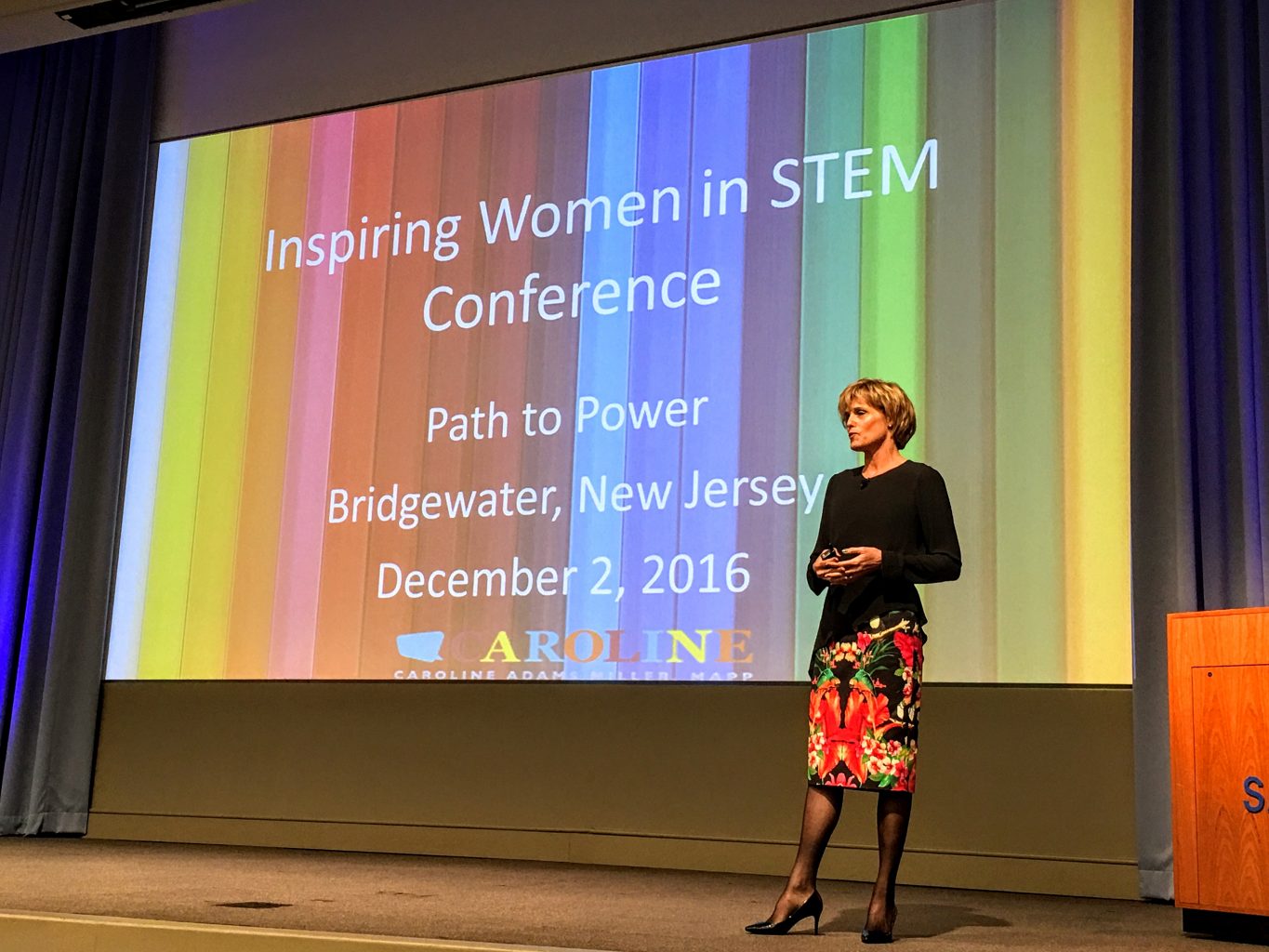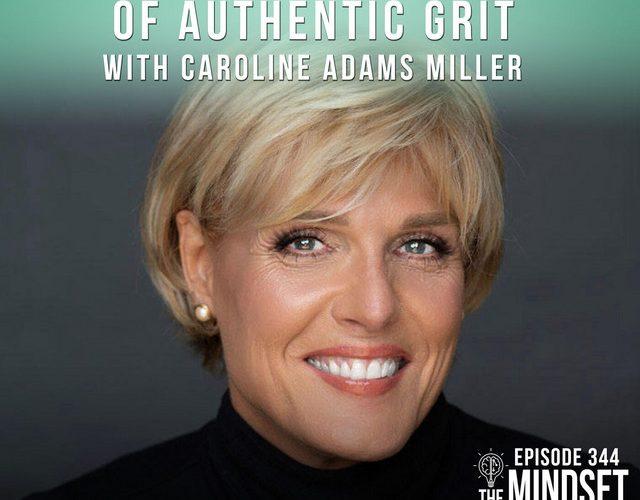By Meg Fry – NJBiz – December 13, 2016
SpeakEasy is a running feature in NJBIZ in which we recap presentations given by key business leaders around the state. This report is based on a speech delivered by Caroline Adams Miller, author, speaker and expert in positive psychology, at BioNJ’s second annual “Inspiring Women in STEM” conference on Dec. 2.
Caroline Adams Miller said she realized too late how unprepared she was to deliver her keynote.
“My stylist once told me, ‘It’s all about the shoes,’ and I arrived this morning in riding boots because I left my shoes in my hotel room,” Miller said to the more than 100 who attended BioNJ’s second annual “Inspiring Women in STEM” conference at Sanofi U.S. in Bridgewater. “I walked around this morning, looking at people’s feet, until I saw a woman with black and gold shoes. I went up to her and said, ‘What size shoes do you wear?’ I want Linda Parker to stand up, because I am now in her shoes!”
Some might call such an unusual request bold or creative.
Miller, a professional life coach, positive psychology expert, best-selling author and speaker, exemplified a characteristic she calls “authentic grit,” or “passion and perseverance in pursuit of long-term goals.”
Even though her objectives have far surpassed the pursuit of pretty shoes.
Miller — also a top-ranked competitive swimmer with a black belt in Hapkido — graduated magna cum laude from Harvard University and from the ground-breaking Master of Applied Positive Psychology program at the University of Pennsylvania in 2006.
Her seventh book, “Getting Grit,” will be released next spring.
“The topic of grit evokes such strong feelings from people,” Miller said. “We all have something to say about it — what is it, where did it go and how do we get it?”
Grit, according to Miller, requires a few ingredients.
First, one must remain positive and hopeful.
“People with authentic grit ask, ‘Why not me? Why not this challenge?’” Miller said.
They also surround themselves with only likeminded and supportive people.
“Eighty-four percent of women today say they have ‘frenemies,’ and what I will tell you is that friends who are enemies will undermine our goals, our success and our well-being without us even knowing that it is happening,” Miller said.
A gritty person will also be intellectually and socially humble, she added, often engaging in courageous pursuits that make a difference in the world.
“Acting with such a goal in mind will make others feel that they themselves need to up their own game,” Miller said.
Lastly, grit requires patience and self-regulation.
“The average attention span of a human being right now is one second less than that of a goldfish,” Miller said. “You have to be able to say no to yourself.”
While grit may seem like a lot of work, Miller said there are a few reasons why it has become a non-negotiable characteristic.
“We live in a world now with global terrorism, a 24-hour news cycle and an incoming president who has made sport of talking about women’s bodies,” she said. “I think I took for granted that, if you were competent and confident, you could get the job done. You would be accepted. That is no longer true.”
Miller believes women, especially, must help to again cultivate a culture of grit.
“Every single person I have ever interviewed over the last few years, male or female, who met my definition for authentic grit spontaneously talked about a woman when asked from whom they learned to be the way that they are,” she said. “I want every one of you to become the subject of someone else’s story of overcoming.”
Grit can and must be cultivated as early as 7 years old, not only for culture, but also for workforce development, Miller said.
According to Miller, Angela Duckworth’s Grit Scale has become one of the most popular tests in which to measure resilience of incoming students or employees.
“Companies today are now looking to hire for grit,” she said. “Who should we hire if we need them to stay late? Who should we hire for a long-term project, someone that won’t be looking for a new job after six months to a year?”
Miller said the American Enterprise Institute, for example, has an interesting method of scanning thousands of resumes for summer internships.
“(They) look for the kids who participate in early morning sports — crew, swimming, wrestling — when there aren’t any cheerleaders. They look for the Eagle scouts who didn’t quit when it stopped being pinewood derby and it started meaning giving up nights and weekends with friends,” she said. “And they look for kids who grew up on family farms who could not get out of milking the cow, even though it was cold and they were tired.”
Grit, however, is not simply reserved for the special few up on Mount Olympus, Miller said.
“If you want to be gritty, you can become gritty,” she said, by maximizing well-being and self-efficacy.
“People succeed in life because they are happy first,” Miller said. “Most people think, when I get that job, that house, that spouse, that grade, that body, then I will be happy.
“What research has been very clear on is that none of that is true. You have to flourish emotionally first if you are going to be successful at anything.”
Self-efficacy, a key trait of happiness, is the desire and determination to ‘figure it out’ when faced with challenges and big dreams, Miller said.
One can build self-efficacy by writing down goals and visibly breaking them down into actionable steps.
“If you break your goals down into small pieces, you build happiness,” Miller said. “When you are happy, you accomplish your goals.”
Achievement is not simply about getting up and doing what was left undone or being reactive, Miller said — it is about getting up to do the things that are often difficult.
“The happiest people wake up every day to clear-cut short- and long-term goals, many of which are uncomfortable and out of their comfort zone,” Miller said. “Hard goals are goals that you are not sure you can accomplish. A vast majority of people never choose hard goals. Why? People don’t want to fail and disappoint themselves.”
Unfortunately, the idea that people need to be protected from feeling bad about themselves is one that has invaded our culture, Miller said.
“High standards create high performance. High-performance cultures create high-performing individuals,” she said. “That is why grit is so hot.”
And “awesome” is not. According to Miller, research has shown that using the word “awesome” all the time has caused our society to become deprived of actual awe.
“We have to put the awe back into awesome, and we do that by inspiring other people with gritty behavior,” she said. “What is it going to take for you to become a story that other people tell?”
More often than not, it is complete and utter failure, Miller said.
“My kids developed their grit from their biggest setbacks in life — the things that brought them to their knees and broke them. The things that we did not bail them out from,” she said. “Those were blessings.”




